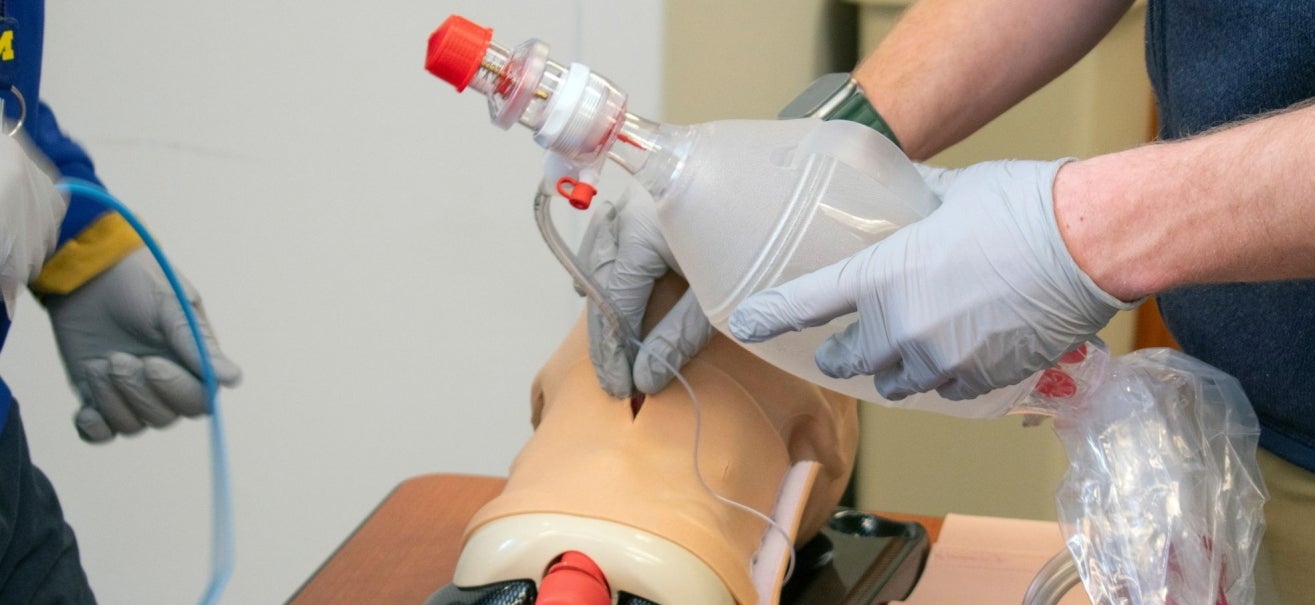
Published February 13, 2025. Revised February 24, 2025.
When a patient’s airway is lost during surgery, it’s a rare but critical event. Both anesthesiologists and certified registered nurse anesthetists need to know how to quickly establish a surgical airway.
That’s why the University of Pittsburgh’s School of Nursing and of Medicine have joined forces to train anesthesia professionals in what is known as front of neck access surgical airway management.
The project started in 2022 through the efforts of Anna Breedlove and Emily Baldwin, then University of Pittsburgh Doctor of Nursing Practice (DNP) students. They began working with faculty in the two schools to create a focused simulation training workshop that uses simulators to train clinicians on the scalpel-bougie front of neck access technique.
Dr. Charles Lin, assistant professor in the Department of Anesthesiology and Perioperative Medicine at the School of Medicine, and Dr. John O’Donnell, professor and chair of the Department of Nurse Anesthesia and director of the Nurse Anesthesia Program at Pitt Nursing, identified a gap in surgical airway management training for anesthesia staff. They recruited nursing faculty member Dr. Joseph Goode to join the project given his expertise in airway management.
Dr. Lin noted the importance of surgical airway management for emergency medicine and said that while anesthesia providers receive training in this advanced airway technique, repetitive training is rare after graduation.
The need for continued medical education has led to the creation of a series of educational workshops involving Pitt DNP students who created PowerPoint presentations and other course materials to pilot the focused scalpel bougie front of neck access surgical airway workshop. The original workshop was held in 2022 and was funded by the Passavant Hospital Foundation and a grant from the Society for Simulation in Healthcare.
A testing cohort of 20 anesthesia student providers was trained and evaluated to validate the course content and process. Since Breedlove and Baldwin graduated, a new group of DNP students --Jessica Guan, Larry Sears, Ryan Caufield, Morgan Darling, Lauren Motolik, and David Gornall -- was recruited. They are working to increase workshop efficiency, rigorously test educational methods, and offer the workshops, which are designed to train teaching faculty, and eventually, practicing anesthesia staff at UPMC Passavant.
Drs. Lin and O’Donnell later received funding from the Beckwith Institute to scale these workshops from UPMC Passavant to all UPMC hospitals. This spring, a “train the trainer” workshop at UPMC Passavant will expand the training across seven adult UPMC hospitals this summer. In the fall, the students will collect data on the implementation of these workshops with the aim of completing the work in 2026.
The three faculty leaders on this project have now worked closely with each other for the past three years, recognizing that the need for close interprofessional collaboration in developing and delivering these educational offerings required a team effort. They are especially proud that this project can serve as an exemplar for other projects in recognition that the field of anesthesia is unique and requires nurses and physicians working closely together to maximize outcomes.
“It’s a skill that both the nurse anesthetists and physicians need to know,” Dr. Lin said.
Dr. O’Donnell noted that Dr. Lin, who also holds a secondary appointment at the School of Nursing, “has a unique combination of clinical expertise and educational research interest that has fueled and supported the project.”
The interprofessional collaboration between Pitt students, faculty, and UPMC clinicians is helping to train staff at multiple hospital sites this year. Dr. Lin hopes the workshops can serve as a case model to help educators in other fields.
